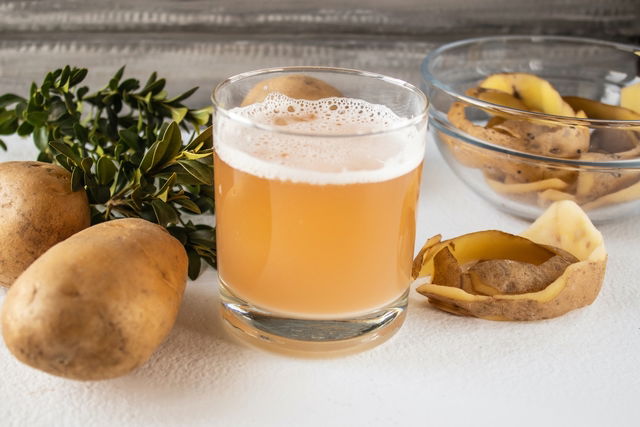Potato juice is a highly alkaline drinks and acts similarly to antacids by neutralizing the acidity of the stomach. It has a calming effect on inflammation in the digestive system, and can be used to relieve heartburn related to gastritis or stomach ulcers.
Potato juice, or potato water, is only effective if made with with white or yellow potatoes, and not sweet potatoes or yams.
It is important to highlight that drinking potato juice, like taking antacids, does cure the underlying cause of heartburn. However, it is a good natural remedy to help relieve the discomfort of reflux caused by poor digestion and reflux.

Health benefits
Potato juice can help improve overall gastrointestinal health and aid in the treatment of health conditions such as:
- Gastritis
- Stomach ulcers
- Burning sensation in the stomach
- Gastroesophageal reflux
- Heartburn
- Poor digestion
In addition, by reducing inflammation in the digestive tract, potato juice can also help relieve the symptoms of constipation, bloating and intestinal cramps. Check out other home remedies for gastritis that you can take when treating mild symptoms with potato juice.
How to make potato juice
Potato juice can be prepared daily with raw, unpeeled and well-washed potatoes. It is important to avoid using potatoes with dark spots, a greenish color or that have sprouts.
Ingredients
- 1 raw potato
- 100 to 200 ml of water
How to prepare
Peel the potato and place in a food processor, blender or mixer and blend. Add a little water to make the juice more liquid and easier to drink. Another way to prepare potato juice is to put the ingredients through a centrifuge. Then strain and drink the potato juice unsweetened. This juice can be consumed once a day, preferably 30 minutes before breakfast.
To relieve stomach issues, it is also important to maintain a healthy diet. You should opt for easy to digest foods such as vegetables, fruit and legumes, like carrots, broccoli or cooked apples, especially during acute heartburn flare-ups. In addition, you should avoid foods that are high in fat, such as fatty cuts of meat or fried foods, as well as soft drinks, coffee, green or black tea, salty snacks, cookies or spicy foods, for example. These tend to stay in the stomach longer or cause irritation to the stomach. Learn more about the gastritis diet you should maintain and incorporate potato juice into.
Possible side effects
When taken in larger quantities than recommended, potato juice can cause side effects such as diarrhea, stomach pain or nausea.
In addition, potatoes can increase the amount of sugar in the blood and cause an imbalance in blood glucose levels, especially in people who have diabetes. For this reason, potato juice should be used with caution by diabetics.
